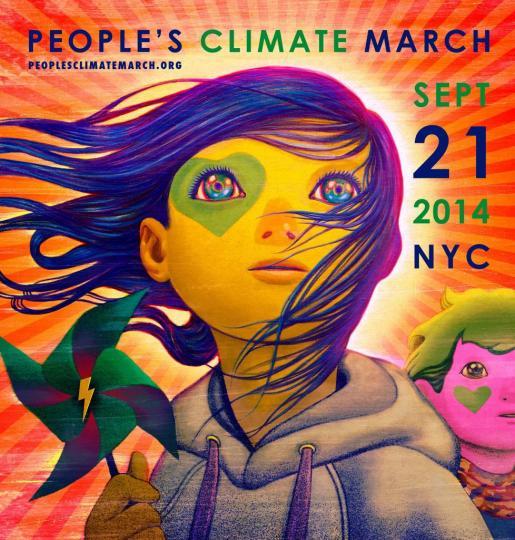
Demonstrators, along with world leaders, are beginning to congregate around the United Nations headquarters in New York City this week in advance of the U.N. Climate Summit 2014. Inviting leaders from around the world to participate in the one-day climate conference, U.N. Secretary-General Ban Ki-moon is calling on them to “galvanize and catalyze climate action” and “bring bold announcements and actions to the Summit that will reduce emissions, strengthen climate resilience, and mobilize political will for a meaningful legal agreement.”
Along with the U.N., multilateral development banks (MDBs), such as the World Bank Group, have comprised the core of the institutional framework for international governance, development and finance since the end of World War II. Criticized for financing coal-fired power plants and supporting polluting, emissions-intensive development in developing countries worldwide, the World Bank just over a year ago said it would only finance coal-fired power plant projects in rare, exceptional circumstances.
On Sept. 11, the world's six MDBs “reaffirmed their shared commitment to lead by example by continuing to reinforce and further develop climate financing.” The African Development Bank (AfDB), Asian Development Bank (ADB), European Bank for Reconstruction and Development (EBRD), European Investment Bank (EIB), Inter-American Development Bank (IADB) and World Bank Group said they would continue to focus their resources on addressing climate change.
That includes leveraging MDB financing by attracting greater amounts of private-sector investment, as well as "continuing to innovate and promote more robust and transparent climate finance tracking and reporting,” according to a joint press release.
Tackling climate change and poverty
World Bank President Jim Yong Kim is the first scientist to lead the world's leading MDB. Under his leadership, the World Bank has been more proactive in addressing climate change – for its socioeconomic as much as for its ecological and environmental impacts. As Climate Progress's Ryan Koronowski wrote in a 2013 blog post, “Kim has said it is impossible to tackle poverty without dealing with the effects of a warmer world.”
In the 2006 Stern Review and subsequent research studies, researchers concluded that the overall projected costs associated with runaway climate change under “business-as-usual” scenarios far outweigh those associated with taking early action to transition from a global economy powered by fossil fuels to one that relies primarily on a locally-appropriate mix of distributed renewable and clean energy resources.
Reducing GHG emissions need not detract from economic and social development, the U.N. says. To the contrary, instituting initiatives that reduce fossil fuel use and GHGs can foster more equitable and eco-friendly sustainable development. Policies that aim to lower GHG emissions to address climate change have the potential to address societies' most profound and vexing challenges and benefit people living in developing and developed countries alike, the U.N. asserts.
MDBs and climate finance
Often the first to invest at-scale and open up new opportunities to address pressing socioeconomic challenges across the developing world, the world's six MDBs chart the course that guides international humanitarian and socioeconomic development financing across the public and private sectors.
By joining to reaffirm their commitment to improving and providing broader, more equitable access to climate finance, they are throwing their considerable weight behind that of the U.N., which is in the final stages of formulating the Sustainable Development Goals (SDGs) that are to succeed the Millennium Development Goals (MDGs). Like the MDGs, the U.N.'s SDGs will set the strategic course for the world's preeminent body for international governance, development aid and investment.
Speaking for EIB, VP for climate action Jonathan Taylor stated:
“The European Investment Bank is committed to supporting investment that reduces greenhouse gas emissions and enables adaptation to the consequences of climate change. As the EU bank we share the commitment of other multilateral development banks to enabling climate related investment in developing countries and continually seek to share experience from across all our areas of operation.”
Collectively, the six MDBs have provided over $75 billion in financing for developing countries to address the impacts of climate change. Some 80 percent of that, on average, has gone towards investments in climate change mitigation. About 20 percent has been allocated for climate change adaptation.
The six MDBs also said they will begin tracking and accounting for their climate finance investments in the same way. That's expected “to enable greater cooperation and shared experience between the banks and other financial bodies involved in climate action,” they explain.
Climate Week NYC
Along with the gathering of world leaders, a lot in the way of grassroots activism is expected the week of the U.N. Climate Summit 2014. A broad coalition of business, government, environmental, social justice and public interest groups, among others, are organizing what's expected to be one of the largest demonstrations in the U.S. since the Vietnam War and "No Nukes" protests.
More than 1,000 organizations have pledged support for the People's Climate March scheduled to take place in midtown Manhattan Sept. 21. Students from more than 300 U.S. colleges and universities are expected to participate. The march should be the highlight of a week's worth of planned high-profile events aimed at getting world leaders to take stronger actions to address climate change.
Image credits: 1) U.N. Climate Summit 2014 2) 2006 Stern Review

An experienced, independent journalist, editor and researcher, Andrew has crisscrossed the globe while reporting on sustainability, corporate social responsibility, social and environmental entrepreneurship, renewable energy, energy efficiency and clean technology. He studied geology at CU, Boulder, has an MBA in finance from Pace University, and completed a certificate program in international governance for biodiversity at UN University in Japan.














